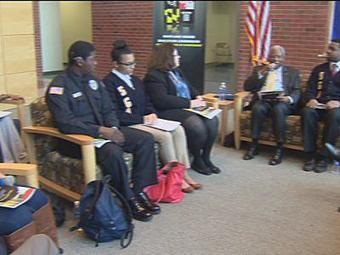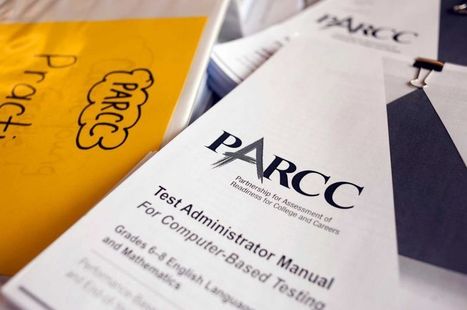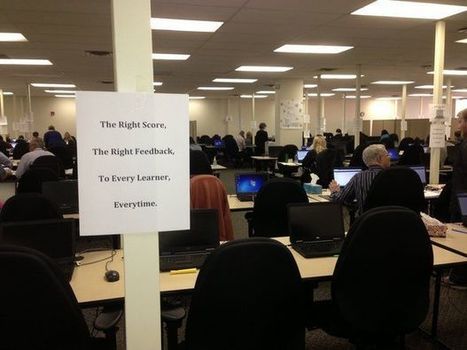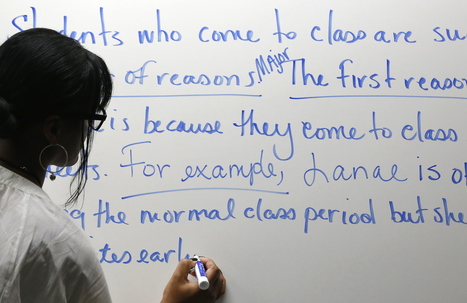 Your new post is loading...
 Your new post is loading...

|
Scooped by
Mel Riddile
May 14, 2015 5:16 PM
|
In 2007, the Thomas B. Fordham Institute published what was probably the most influential study in our eighteen-year history: The Proficiency Illusion. Using data from state tests and NWEA’s Measures of Academic Progress, our partners at NWEA estimated the “proficiency cut scores” of most of the states in the country.

|
Scooped by
Mel Riddile
May 14, 2015 10:21 AM
|
"PROVIDENCE, R.I. -- The American Civil Liberties Union, Rhode Island, and 14 other organizations have sent letters to every school committee in the state asking them to postpone tying the new state assessment to high school graduation. The letter, signed by such groups as the NAACP, Providence, The Providence Student Union, Young Voices and the R.I. Disability Law Center, calls on local school committees and superintendents to "avoid any use of the PARCC scores for graduation or grading purposes until the 2020 date established in the (state) regulations."

|
Rescooped by
Mel Riddile
from Common Core Online
May 11, 2015 3:45 PM
|
Providing instructional and assessment tasks, lesson plans, and other resources for teachers, assessment writers, and curriculum developers since 2011.
Via Darren Burris

|
Scooped by
Mel Riddile
May 8, 2015 9:37 AM
|
It’s time to debunk the myths about who is good in math, and Common Core state standards move us toward this worthy goal. Mathematics and technology leaders support the standards because they are rooted in the new brain and learning sciences. All children are different in their thinking, strength and interests. Mathematics classes of the …

|
Scooped by
Mel Riddile
May 7, 2015 9:46 AM
|
Montana unlikely to meet test participation requirement.
HELENA (AP) — Montana's top education official says the state is unlikely to reach the required participation rate in student achievement tests this year.
Standardized Testing Season Encounters Tech Glitches, Parent Resistance. The AP (5/7, Hefling) reports that this year’s round of new standardized tests designed to conform to Common Core standards has encountered technology issues and parental resistance nationwide. As states transition from paper to online testing, problems were reported in Nevada, Montana, North Dakota, and Ohio. However, the article cites California’s Department of Education as saying that testing for its 3.2 million students was going “smoothly.” A growing number of parents are having their children opt out of standardized tests over fears that the regime has become excessive and detracts from useful instruction. The AP (5/5, Noon) reports separately that Montana is “unlikely” to reach the federally-mandated 95 percent participation rate this year due to school opt outs. Superintendent of Public Instruction Denise Juneau made the testing option last month after widespread technical glitches delayed the first testing sessions. The Billings (MT) Gazette (5/7, Brouwer) reports that the decision to allow the opt outs may not have been Juneau’s to make, as a statewide rule made by the Board of Public Education mirrors Federal requirements that all students in grade seven take the tests. The Board is separate from Juneau’s office and has authority over the state’s schools granted by the Montana Constitution. Juneau later apologized for excluding the Board, and members “appeared sympathetic” to Juneau’s situation in a conference call last month. They will meet Thursday to discuss the situation.

|
Scooped by
Mel Riddile
May 6, 2015 12:39 PM
|

|
Scooped by
Mel Riddile
May 6, 2015 7:16 AM
|
The CCSS-M standards are currently being blamed for all that is wrong with mathematics education today. At least from adults who had a different experience of mathematics during their own childhood education. But this is flawed for at least two reasons. First, standards do not dictate how mathematics is taught; they represent, rather, what the goals of its teaching should be. In the CCSS-M, these rightly include conceptual and procedural aspects. Whether a student learns to understand these mathematical ideas by rote repetition and algorithms, familiar to many adults of today, or by the “loosey-goosey” “let the student reinvent everything” approach of more recent reforms, the standard remains. Standards do not dictate pedagogy: they outline the goal, not the process, of mathematics education.

|
Scooped by
Mel Riddile
May 4, 2015 10:29 AM
|
Thousands of experts and educators work together on a thorough and detailed process to create tests that are fair and accurate. Learn more.

|
Scooped by
Mel Riddile
May 3, 2015 2:11 PM
|
New studies show how a four-year degree greatly benefits even marginal students.
students do better when they stretch themselves and attend the most selective college that admits them, rather than “undermatching.”

|
Scooped by
Mel Riddile
April 30, 2015 2:07 PM
|
By Alex Sczesnak, Algebra 1 Teacher, Math Department Chair, and UFT Chapter Leader at Metropolitan High School in the South Bronx*
This has been a boon for teachers everywhere; most would agree that these standards are far more focused and coherent than anything we’ve implemented previously, leading to curricula that make math meaningful for students in ways that were not previously possible."
"we’ve made a lot of progress in the past few years, and we’ve got hurdles yet to clear, but in the meantime I would encourage patience on the part of all math teachers not yet won over by the high school standards. As we become increasingly adept at mastering the expectations of the Common Core, and as more and better curricular resources are made available, I expect that teachers, administrators, students, and parents alike will find that the CCLS are a significant improvement over the way math has been taught previously."

|
Scooped by
Mel Riddile
April 29, 2015 9:55 AM
|
With the oil and gas industry slowing down and laying off workers, it's easy to forget that Houston and Texas continue to suffer from a lack of qualified workers. Employers in other industries continue to compete for skilled workers and many jobs go unfilled. Part of the problem is that in addition to an underperforming public school system, the public university system is not producing enough graduates.
Skilled Worker Drought. The Houston Chronicle (4/29, Tomlinson) reports that a new report argues that while Texas managed to grow its jobs during the recession, it also has “the highest percentage of minimum-wage workers” and a lack of skilled workers due to the following: - Low levels of college degree receipt
- Low per-student funding
- Poor SAT scores
- High rates of low income families without college degrees

|
Scooped by
Mel Riddile
April 29, 2015 9:45 AM
|
U.S. middle-school students’ performance on social studies didn’t improve much between 2010 and 2014, federal test scores show.
NAEP Releases Test Results For US Students’ Social Studies, Civics Knowledge. The Wall Street Journal (4/29, Porter, Subscription Publication) reports that the National Assessment of Educational Progress has released its latest Federal test scores for middle and high school students’ performance in social studies, showing that the number of students scoring at or above proficiency in US history last year was 18%, an increase of one percent compared with 2010, while civics and geography scores were similarly lackluster. National Assessment Governing Board Chair Terry Mazany decried the flat-line results, but many teachers say Federal testing standards are to blame for relegating non-STEM subjects, plus reading, into a non-essential category. The AP (4/29, Hefling) reports that 2014’s test results “were similar to those four years ago when the assessments were last administered.” While 18 percent of students were at least proficient in US history, 27 percent were proficient or better in geography, and 23 percent performed well in civics. The tests were administered by the Education Department’s National Center for Education Statistics. Also, the AP notes some trends in social studies education, which “is going digital” and increasingly involving computers. The Huffington Post (4/29, Resmovits) reports that America’s eighth graders set “a stubbornly low bar” in the tests, having scored “no better on average than in 2010,” although the scores were “slightly improved from 1994.” National Assessment Governing Board Deputy Executive Director Mary Crovo comments for the story, while Acting National Center for Education Statistics Commissioner Peggy Carr “said there is some reason for optimism about the history results,” particularly with respect to Hispanic students.

|
Scooped by
Mel Riddile
April 28, 2015 11:03 AM
|
The ACT is mandated for all high school juniors in Colorado and can help determine college placement. But the benefit of having PARCC is students take the exam over multiple years and can begin remediation before they need it in college, said Rhonda Epper, chief student academic affairs officer for the Colorado Department of Higher Education. “PARCC provides another avenue for students to demonstrate college readiness, and it can give feedback to students about where they are with respect to skills they need early in their high school career,” Epper said. “National awareness is growing that for students who begin in remedial courses the barriers to success are extremely high.”
|

|
Scooped by
Mel Riddile
May 14, 2015 12:29 PM
|
Washington, D.C. - May 14, 2015 - Achieve today released a new report that highlights the fact that too often, state-reported proficiency rates in English Language Arts (ELA)/literacy and mathematics are disconnected from other benchmarks of readiness and vary widely from state to state. The report, "Proficient vs. Prepared: Disparities between State Tests and the 2013 National Assessment of Educational Progress (NAEP)," details the discrepancies between student proficiencies as reported by states to students, parents, and educators, and as reported by NAEP, considered the gold standard of student assessment for comparisons across state lines.

|
Scooped by
Mel Riddile
May 14, 2015 9:29 AM
|
I support Common Core for students in Nevada because I believe in the culture of innovation that I see when students are engaged in relevant learning. I want my students to be on the path to college so that when they're the first in their families to attend, they start with credit-bearing courses rather than remediation, and they find enjoyment in higher education. Common Core is not an experiment on students I get to work with each day; instead, it's the equalizer that all kids need to reach their limitless potentials.

|
Scooped by
Mel Riddile
May 11, 2015 12:06 PM
|
The sixth in a series of letters between two principals, one who supports the Common Core and the other who doesn't. In this, one of the educators says that the Core isn't to blame for the things that are driving parents to opt out their kids from high-stakes standardized tests.

|
Scooped by
Mel Riddile
May 8, 2015 8:55 AM
|
It turns out that the stakes for this spring’s Common Core-aligned tests are not quite as high as they might seem. The Hechinger Report surveyed the District of Columbia and all 44 states* that have adopted the Common Core and will be administering a Common Core-aligned test this spring to find out how they plan …

|
Scooped by
Mel Riddile
May 6, 2015 12:48 PM
|
[...] testing officials say the rollout this spring of new standardized tests taken by computer in U.S. public schools has been without major problems in much of the country. The new exams are expected to be harder in many states than the state assessments they replaced, but they've been billed as a more accurate testing of what students are actually learning. The new assessments developed by two groups of states are called Smarter Balanced and Partnership for Assessment of Readiness for Colle

|
Scooped by
Mel Riddile
May 6, 2015 12:26 PM
|
Graders of the PARCC Common Core tests use a rapid assembly-line scoring process from Pearson Inc. to easily grade a student answer per minute on many tests.

|
Scooped by
Mel Riddile
May 5, 2015 9:15 AM
|
At some schools, they're more about college prep than college credit.

|
Scooped by
Mel Riddile
May 4, 2015 9:27 AM
|
Common Core has become a punching bag for conservatives, but the set of school standards still has its fair share of outspoken supporters, including moderate Republican governors and powerful advocacy groups such as the NAACP.
The standards — adopted voluntarily by states and heavily promoted by the Obama administration — remain especially popular among parents of minority students, even as overall support for Common Core shrinks, polls show. Ohio Gov. John Kasich has called out fellow Republicans for seemingly turning their backs on the standards after wholeheartedly advocating them years ago. Influential groups such as the National Urban League and the National Council of La Raza also are trying to rally support.

|
Scooped by
Mel Riddile
May 1, 2015 10:55 AM
|
Colorado legislation would allow people to file lawsuits against schools if an act of violence occurred that could have been prevented. Schools have raised concerns with the bill, pointing out that expanding liability could have consequences on budgets. They also worry about schools taking radical steps, such as disciplining students simply out of fear of liability. In the case of Davis, the shooter had a history of incidents, which the district deemed a low-level threat, despite the shooter shouting a death threat against a school employee earlier in his history. Lawmakers addressed some concerns from schools by amending the bill to exempt a failure to suspend or expel a student. It also was amended to state that an employee is not subject to a lawsuit unless the employee’s actions are intentional or reckless. Another amendment created a two-year timeout for districts before damages would be assessed by a court. And on Thursday, the bill further was amended to exempt negligence during the timeout.

|
Scooped by
Mel Riddile
April 30, 2015 12:53 PM
|
Parents should know that Common Core State Standards are: • High academic expectations for students in English language arts and mathematics;
• Internationally benchmarked expectations, similar to those in high-performing countries;
• Designed by teachers and other learning experts across the country;
• Informed by the most advanced and current thinking on what students should know and be able to do at each grade level;
• The result of a multi-state effort to prepare all children to succeed, especially students who by necessity move from one state to the next;
• Not curriculum or assessment. They are a clear set of learning expectations that local teachers and districts use to provide customized instruction that meets the needs of their students;
• Aligned with the development of 21st-century skills, which are necessary for success in college and the workplace.

|
Scooped by
Mel Riddile
April 29, 2015 9:48 AM
|
Equal Opportunity Schools, the College Board, International Baccalaureate, and others join forces to expand programs that encourage underrepresented student to enroll in advanced courses in high school.
Initiative To Recruit Low-Income, Minority Students To AP And IB Classes To Spend $100 Million. Education Week (4/29, Adams) reports in its College Bound blog that education, nonprofit, and business leaders are looking to spend $100 million to boost Advanced Placement and International Baccalaureate enrollment among low-income students and students of color by 100,000 in the next three years. Initiative participants include the College Board, the IB organization, the Jack Kent Cooke Foundation, Google, and Tableau Software, Inc, among others. Founder and CEO of EOS Reid Saaris said that the program was the “largest commitment ever to fully reflecting America’s diversity at the highest academic levels in our K-12 schools.” The program will use data from grades, surveys, and test scores to encourage students that may not otherwise take the courses to choose college-preparation classes.

|
Scooped by
Mel Riddile
April 28, 2015 2:18 PM
|
Naesea Price teaches a lesson on sentence and paragraph structure in a remedial English course at Baltimore City Community College. "College readiness" has been redefined as ready to take middle-sc...
|
 Your new post is loading...
Your new post is loading...
 Your new post is loading...
Your new post is loading...






























